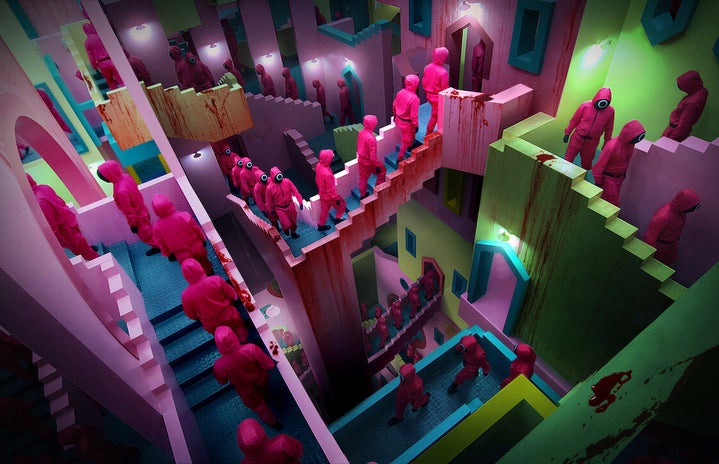I remember watching Squid Game in 2021 and being so enthralled by the various challenges the contestants were put through that I couldn’t help but visualize how I would approach each of the games. From the plot’s creativity, to its suspense, to its dynamic characters, Squid Game was a massive success — so successful that Netflix created a reality show based on it…
If you aren’t familiar with the premise of the original show, Squid Game follows Seong Gi-hun, an indebted gambler, who gets invited to play a series of children’s games where the winner receives a large monetary prize. When he agrees, he’s made unconscious and is transported to an unknown location where hundreds of financially struggling people are also interested in attaining that cash prize. While it seems like a golden opportunity, the catch is that those who lose the games are killed. These innocent children’s games are spun into a bloody, competitive match of survival, as the competition is full of betrayal, violence, and loss.
In Netflix’s Squid Game: The Challenge, audiences see familiar games like Red Light, Green Light and the Honeycomb Challenge from the original series, but the reality show adds news games like Warships and includes small tests that are conducted outside of the main games. It’s definitely an entertaining concept for viewers to binge, as much like the original show, one can watch as alliances are formed and broken as more money is added to the prize (they literally watch as the money falls into a giant piggy bank suspended from the ceiling).
Immediately, the reality show centers its focus on a specific players that they want audiences to pay closer attention to. There’s LeAnn and Trey, a mother and son duo; Mai, an immigration adjudicator; Phill, a scuba instructor; and Sam, an artist, just to name a few. In between the games, the show offers one-on-one interviews with various contestants so audiences can get to know them better, even displaying what each would do with the cash prize. Some wanted to donate to personal causes, others would like to spend it on their family and friends.
While it’s an opportunity to accumulate wealth without facing certain death like in the original series concept, the reality show still feels somewhat…dystopian. While Squid Game has a genuinely entertaining concept, the show’s message revolves around capitalism and its exploitative nature of lower and working classes. We watch ordinary people get pitted against each other, humanity slipping away as goals for survival and money consume each participants’ minds. It’s a dark, dismal concept of people potentially losing their lives in the attempt to even live in the real world’s economy, and to create a game show off of these real problems leaves a bad taste in the mouth.
As James Poniewozik writes for The New York Times, the message of Squid Game: The Challenge, is “an object lesson in how entertainment can appropriate any artistic or political statement. There is no dystopia so chilling that, with the right production values, you can’t sell it back to the audience as escapist fun.” Even when I started the first episode to see what all the fuss was about, I couldn’t help but feel uneasy. The set is identical to that of the show with its bright colors and the recognizable green of the contestants’ jumpsuits, but nonetheless, I was still watching an eerie replica of an exploitative system playing out as a fun, entertaining game show.
While there’s been much criticism regarding how the reality show misses the anti-capitalist point of the original series, executive producer, Tim Harcourt’s response to these criticisms claimed that the show is “about how people behave under pressure — and that’s what makes reality shows interesting…also, the drama was about people fending off their desperate circumstances to win a huge prize. Our show isn’t about people in need. It’s about people being presented with an opportunity.”
While the show can be viewed as a social experiment, incorporating people that are already financially comfortable also seems tonally deaf. The drama showcases desperate people who struggle with immense debt and poverty, and for them, the squid games are their last resort. The reality show, in sharp contrast, seems to inadvertently make light of this fact by showcasing financially stable people in a controlled environment; it distances itself from the true horror of the drama series and attempts to paint it as strict entertainment. The drama also touches on this idea of finding entertainment value in people’s struggles as rich, white men in masks watch as the final squid games play out, which only makes Squid Game: The Challenge look ten times worse.
On top of missing the point of Squid Game, there’s been much controversy regarding the conditions of the reality show, specifically during the Red Light, Green Light challenge. Contestants claimed that they suffered injuries like hypothermia and nerve damage because of how freezing it was. @GrandmaGoneWild, one of the contestants in the show, stated in a Tiktok, “People were collapsing left and right, all over, all during the game, calling for medics. So there were several things that delayed the game, so the timer wasn’t really a timer — it was more like a prop.”
There are a lot of issues regarding Squid Game: The Challenge and reality shows in general, but this one proves to be one of the most dystopian of them all. While it’s guaranteed as one of the most ambitious reality shows out there, it ultimately falls flat when it comes to being socially aware.


